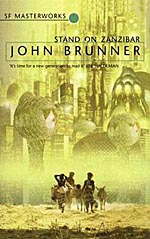
![]() ScoLgo
ScoLgo
8/20/2014
![]()
A scathing look at race relations, corporatism, and nationalism in a near-future dystopia. There is something about Brunner's rather dry writing style that does not fully appeal to me but, despite that, this was an interesting story that kept me reading. I sort of skimmed through most of the techno-babble info-mercial stuff because I didn't think it added much to the core narrative but it certainly did add to the world-building. Viewed from that angle, it was a very clever device.
Brunner is a bit short on characterization and his dismissal of women as 'shiggies' that are mostly there to be sex objects rubbed me the wrong way after a while, (yes, I get that he is being snarky and sarcastic but it still bugged me). For some reason, the 'Paleass', 'Brown-Nose', and 'Yellowbellies' references didn't bother me as much. Probably because there were male characters from those groups that played important roles in the main story arc. There really were no important or powerful 'shiggies' in the story. The only women in positions of power were old, ugly, or 'mannish'. I happen to find that sort of 'golden age' attitude towards women bothersome.
Brunner also likes to pound his personal socio-political ideals home with a true lack of subtlety, (mostly via his personal stand-in, Chad C. Mulligan). Not that I don't agree with a lot of his viewpoints, (I do), but he kept hammering the same points until their sharp edges were overly dull. With that said, Brunner also shows that he can write some dazzlingly visceral action sequences, (Donald Hogan coming face to face with a 'mucker', for instance). The other thing that saved this book for me was the dialogue. There are some very smart and revealing conversations between characters that help move the plot forward.
In short, while not a 5-star read for me, I can see why this book won the Hugo in 1969. While I am unlikely to re-read it, I do plan on reading more of Brunner's work in the future.